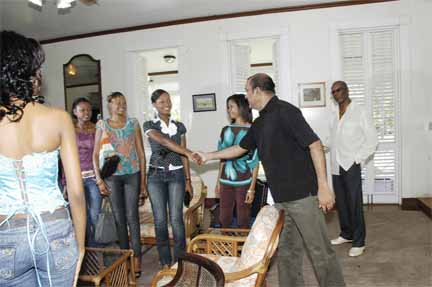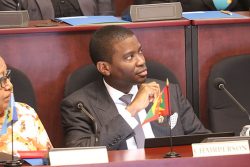Accusing the governing party of attempting to “subvert” the local government reform process, PNCR leader Robert Corbin on Friday said up to the time of his recent illness no attempt was made to begin consultations on legislative reforms for the holding of polls later this year.
His statement came in wake of the government’s tabling on Thursday of the Local Authorities (Elections) (Amendment) Bill 2009, which is part of a suite of legislation that was being formulated by the bi-partisan Task Force on Local Government Reform. The bill was sent to a select committee for review after it was tabled and on Friday PNCR MP Basil Williams said the party would have to make that determination.
Saying that all matters relating to local government reform must be dealt with together, Corbin declared that it would be “a waste of time” to deal with an election bill for a local government system that makes absolutely no change to “an archaic system” that he said the task force was struggling to transform for the last eight years.
Head of the Presidential Secretariat Dr Roger Luncheon said on Thursday that in the face of the delay in the conclusion of promised bilateral talks between President Bharrat Jagdeo and Corbin, the Cabinet agreed to the immediate tabling of the bill and for it to be sent to a parliamentary select committee for wider consideration. He said the Cabinet also agreed on the subsequent tabling of other bills affecting the local government system – the Local Government Commission Bill, the Municipal and District Council (Amendment) Bill, the Fiscal Transfers Bill and the Local Government Bill – but could not say whether all the bills would be placed before the Parliament before the polls.
The government has stated its intention to hold polls before the end of the year. Local government elections have been due since 1997.
Corbin told reporters at a news conference at the PNCR’s Congress Place Headquarters that after the President unilaterally terminated the work of the task force on April 7, he and other opposition parties had been treated with “total disregard” as was evident from the explanations given by the administration and the President himself. “Meanwhile, there was absolutely no interest or desire shown to consult the Leader of the Opposition” up to the time he fell ill on April 25, he said.
Following Corbin’s illness, which led to him undergoing surgery overseas, Luncheon had written to PNCR General Secretary Oscar Clarke requesting “a possible time for an engagement” with the Leader of the Opposition to conclude discussions on bills under review by the task force. But Corbin claimed Luncheon’s letter was only part of “an exercise of political expediency” since the President had publicly stated “his intention of merely having a perfunctory meeting” with him before sending the proposed local government reform bills to Parliament. As a result, he charged that it was evident that the PPP’s objective after eight years of work by the task force was to subvert the process.
“I wish to make it clear that I have no interest in superficial meetings, which are intended to satisfy the political agenda of the PPP,” Corbin said. “My interest, and that of the PNCR, however, is in the successful implementation of local government reform. We will accept nothing less. It is evident, therefore, that no piecemeal approach will be accepted. All the bills which will give legal effect to the entire local government reform process, must be simultaneously addressed and the consensus, as reflected in the report of the task force, implemented.”
Meanwhile, PNCR MP Basil Williams said it was critical that all the legislation be tabled before the holding of the polls, since it has been acknowledged that there is need for reform.
“It doesn’t make sense we [elect] new people and put them back in an old system that we know is dysfunctional,” he said, explaining that even if the PNCR were to win at the polls the government would still have control over local authorities through the Minister of Local Government, who he said could continue to withhold the requisite funds from the various municipalities and the NDCs which were not favourable to the administration. Williams named Georgetown as an example of such a situation.
He noted that the Local Government Commission Bill, which has yet to be tabled, would be a “watershed” in the development of local government in Guyana, since it would establish an independent body that would look after the management and functioning of the various local government bodies. However, he warned that should it go to the parliament and be passed as it was originally proposed, it could see the government wielding “complete control” over the membership that could derail the commission.
Williams also accused the government of subverting the transfer of funds for local bodies, saying that they go instead to Community Development Councils (CDCs) which he deemed unlawful.
“They want to maintain control in the run-up to the national elections,” he said, adding, “We could never agree with what they are proposing to do.”






